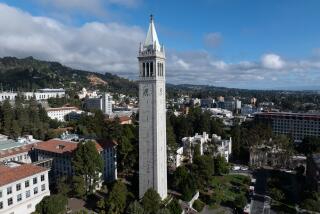American and Egyptian scholars strive to bridge religion gap
- Share via
Reporting from Washington — Fifteen young American religious scholars and 14 teaching assistants from Al Azhar University, one of the oldest and most influential Islamic institutions in the world, spent two weeks together this month at Georgetown University in an attempt to bridge the divide between the Muslim world and the United States.
The potpourri of young scholars studied the legal foundations of American democracy and religious diversity in the U.S. and met with political figures, including White House advisor Valerie Jarrett and Rep. Keith Ellison (D-Minn.), the first Muslim American elected to Congress.
“I met people that I love, and I consider them as my brother, my sister, my mother,” said Ibrahim Elbaz, 30, from Mansoura, Egypt.
The American and Egyptian students spent eight to nine hours in class each day and lived together in Georgetown dorms. The Americans included members of the Jewish, Buddhist and Christian faiths.
At the end of the first week, the Americans joined the Egyptians in prayer, deepening the friendships, said Waltrina Middleton, 30, a recent graduate of Chicago Theological Seminary.
“After that I felt like so much had been lifted; it helped us not be afraid,” Middleton said, her eyes brimming with tears. “The imam opened the prayer in Arabic, but it didn’t matter. They say ‘Allah,’ I say ‘God’ — you know when a prayer is being lifted up.”
Margaret Cone, a Washington lawyer who conceived of the World Leadership Program in 2004, said she hoped to combat the perception among the world’s Muslims that Christianity dictates American foreign policy. But she was unable to get funding in the Muslim world until President Obama delivered a speech titled “A New Beginning” in June 2009 in Cairo.
Two weeks later, Cone landed a meeting with the crown prince of Abu Dhabi, Mohamed bin Zayed al Nahyan, who gave her a two-year, $2-million gift to stage the conference and another next year.
“The president really opened the door,” Cone said. “People were willing to give things a try.”
Though Al Azhar has a long history of global engagement, the university, under the direction of a new leader, the French-educated Ahmed Tayeb, feels the need to adapt its tactics in light of changing times, said Mahmoud Azab, an Al Azhar professor of Semitic languages and civilizations.
Gihan Ibrahim Shaaban, an Al Azhar professor of linguistics, said the university felt compelled to act by some Americans’ perception that Islam calls for terrorism.
“We have to show the real Islam,” she said.
Patrice Brodeur, an associate professor of Islam at the University of Montreal, who led sessions at the conference, said Al Azhar’s international engagement may surprise some given the university’s history of traditional Islamic scholarship.
Jocelyne Cesari, director of the Islam in the West Program at Harvard and Johns Hopkins universities, said in a telephone interview that she is encouraged that Al Azhar is reaching out, but she said that it is important for the United States to respond in kind.
“If it’s just a one-way initiative, it will bring forth a strong narrative among Muslim society of being the one always making the effort to understand the other,” she said.
Raquel Ukeles, the program’s academic director, said she designed the curriculum to resolve a conflicted relationship many Muslims have with America.
“They have almost a romantic notion of America,” she said. “But they perceive that these civil liberties are not extended to Muslims.”
Elhosseini Elew, a 26-year-old from Al Azhar, said he was apprehensive before the trip.
“I asked myself, ‘Are they ready for me as a Muslim? Is it normal?’ ” he said. “When I came, I was surprised.”
Haitham Abdelrehim, a 24-year-old from Al Azhar, said that although many Americans do not understand Islam, they display its tenets in their actions. He said he would share his observations with those in his village.
“We were amazed at this opening and understanding and acceptance of everyone because that is what Islam preaches,” he said.
More to Read
Sign up for Essential California
The most important California stories and recommendations in your inbox every morning.
You may occasionally receive promotional content from the Los Angeles Times.













